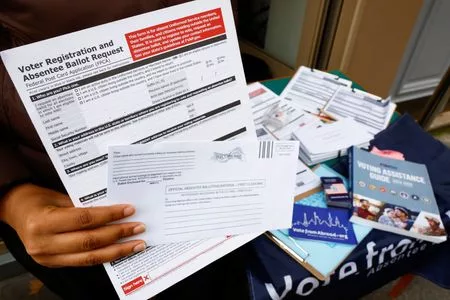By Makini Brice
PARIS (Reuters) – Bob Vallier, a Paris resident who has mostly lived outside the United States for the past 30 years, has already voted in his home state of Michigan for the Nov. 5 election.
“I know that whatever happens in America affects the rest of the world. I know this because I’ve lived in the rest of the world,” said Vallier, the LGBTQ+ caucus chair for Democrats Abroad.
Vallier’s vote, and the ballots of other Americans overseas, may be crucial in the tight races of battleground states like his. Michigan is one of the election’s most competitive states, with latest polls showing Democratic candidate Kamala Harris holding a slight edge over Republican rival Donald Trump.
The Democratic National Committee estimates that 1.6 million U.S. voters abroad are eligible to vote in one of the seven so-called swing states – Arizona, Georgia, Michigan, Nevada, North Carolina, Pennsylvania and Wisconsin – that will likely determine the outcome of the election.
The group is believed to favor Democrats. Among people who used Vote From Abroad, a non-partisan voter support tool linked to the DNC, three-quarters of overseas voters in the 2020 election said they were Democrats.
So for the first time in a presidential election the DNC has given Democrats Abroad funding – around $300,000 – to help register Americans overseas to vote and ramp up its mail-in voting operations and other efforts. It has taken out ads on social media urging Americans abroad to send in their ballots.
“This election will be won on the margins, and every single vote counts,” said DNC spokesperson Maddy Mundy in a statement. “We’re going to win this election by engaging every eligible voter, no matter where they live.”
TRUMP’S CAMPAIGN LOOKS AT TAX RED TAPE
Republican presidential candidate Trump is also after American expatriates. Earlier this month he said he would end the double taxation of overseas Americans.
The former president’s campaign has not offered further detail on how the policy would work but it could end a burdensome requirement that mandates U.S. citizens to file income taxes in the United States regardless of where they live.
While Americans abroad do not have to pay U.S. tax on their first $126,500 in earned income and are eligible for some foreign tax credit, it can be a bureaucratic headache expatriates from many other countries don’t face.
“For many Americans abroad, including myself, the only consistent interaction we have with the U.S. government is through the IRS every April when we have to file and pay our taxes,” said Zennon Kapron, a Singapore-based fintech consultant registered to vote in New York, when asked if Trump’s proposal was a factor he would consider.
“If a candidate seriously addresses tax reform for expatriates, that could influence my decision,” he added.
Solomon Yue, chief executive of Republicans Overseas, said Republicans had fought to improve taxation policies for Americans abroad for years, adding it could “totally” impact the expatriate vote.
“I already see Democrats Abroad panicking,” he said.
Despite Trump’s tax pledge, he has also said, without evidence, that Democrats are pursuing the overseas vote to cheat. The Republican National Committee, which is largely integrated with the Trump campaign, has targeted overseas voting in legal challenges, notably Michigan, North Carolina and Pennsylvania. If the lawsuits are successful, they would decrease the number of Americans abroad who could vote.
The move prompted six House Democrats to write a letter to the defense secretary asking “if this lawsuit will affect the constitutional rights of service members” and referred to House Republicans’ allegations in the lawsuit as an attempt “to sow discord and misinformation.”
THE HURDLES TO VOTE
The challenge with attracting overseas voters, a group whose size is estimated by major political parties and outside experts to be somewhere between 4.4 million and 9 million, is that only a small fraction are believed to vote.
Unlike citizens of many other countries, U.S. voters cannot line up on Election Day at their embassies. Instead, they must submit ballots to the states where they are registered, usually by mail.
According to the U.S. Federal Voting Assistance Program, most eligible overseas voters tend not to vote, with fewer than 8% estimated to have sent in ballots in the 2020 presidential election, compared to an overall turnout rate of 67%. The overseas voter participation rate in the 2022 midterm elections was just 3.4%.
In a neighborhood in central Paris, volunteers set up a stand every Monday and Tuesday afternoons outside a cafe to try and up that percentage by helping Americans navigate the bureaucracies of state and local election laws.
Over the course of two hours, they coax people through the process of registering to vote or to fill out back-up ballots in case things went awry with their original one.
“The problem is that the instructions are not understandable,” said one of the volunteers, Tanya, a retired lawyer.
Claudie Le Corre, a resident of a southeastern Parisian suburb, came to the stand last week because she had not received her ballot from New York, where she’s registered. She believed she had been removed from the voter rolls and filled out paperwork to re-register.
“I am worried about the future, for our children, and all these populist movements – which include Donald Trump – worry me,” Le Corre said.
(Reporting by Makini Brice in Paris; additional reporting by Rocky Swift in Tokyo, Xinghui Kok in Singapore, and Gram Slattery and Trevor Hunnicutt in Washington; Editing by Rachel Armstrong and Ros Russell)
Brought to you by www.srnnews.com







